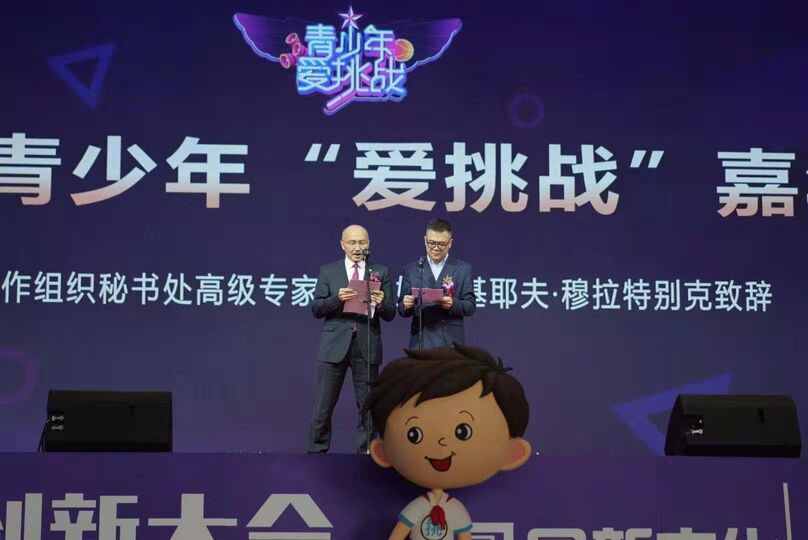The 2nd Innovation-Based Conference on the Digitalisation of Education was held in Xian under the aegis of the People's Government of Shaanxi Province and Weidong Cloud Education Group on 9-10 December. Senior Expert of the SCO Secretariat Muratbek Azymbakiyev took part in the conference.
Mr Azymbakiyev read the greeting message by SCO Secretary-General Vladimir Norov, in which he expressed gratitude to the hosts in the person of high representatives of the Ministry of Education, heads of education departments and other bodies of the People's Government of Shaanxi Province for their great efforts in making the conference possible.
He praised the Weidong Cloud Education Group for its energetic and productive work with an eye towards promoting and demonstrating SCO achievements in education, culture, research and technology. The group also showed great results and advanced innovations in education in the SCO member countries.
The message noted that the SCO Secretariat and Weidong Cloud Education Group have held a number of productive events in research and technology, as well as culture and education in recent years. Weidong Cloud Education responded quickly to the pandemic taking advantage of the corporation's technical strengths and the online education resource to promote distance education in the SCO countries and to jointly counter the pandemic. The current Weidong Smart Classroom project has been successfully implemented in Pakistan, Kyrgyzstan and other SCO member states.
It was noted that during the pandemic, students and faculty used smart devices in smart classrooms and an online learning platform to record a digital course
resource to be used for distance learning, which made it possible to successfully implement the education request through continuing learning after the campus closed.
Weidong Cloud Education Group plans to promote cooperation with the SCO countries as part of the project to create the China-SCO Demonstration Zone, which is a palpable embodiment of President Xi Jinping's initiative advanced during the 2018 Qingdao SCO Summit to build up the potential of regional trade and economic cooperation between China and the SCO countries.
The conference participants were informed that an online meeting of the SCO Heads of Government was held in Delhi, India, on 30 November, and important documents and decisions were adopted, including in education.
Thus, the adopted Action Plan for 2021-2025 for implementing the Programme of Multilateral Trade and Economic Cooperation between the SCO Member States outlines specific areas of focus in education.
Importantly, the member states plan to cooperate in higher and extracurricular professional and secondary vocational training by way of exchanging experience and best practices in the area of professional standards and internship models, including with the use of the capabilities provided by the SCO University. The member states also plan to promote direct contacts between education institutions in the SCO member states and to implement joint projects.
The plan provides for joint events for professional training of research and teaching personnel, including with the use of digital, information and communications technology.
The message also says that 800 million young people live in the SCO space, which is half of the world's youth. In this context, it emphasised that the SCO countries'
leaders pay much attention to working with young people, channeling their energy into creative activities, primarily, through affordable and high-quality innovation-based education, which makes it possible to fully tap a person's potential.
The organisers stated the following goals of the conference: conscientious implementation of the effort to modernise education in China to 2035 and the Action Plan for the Digitalisation of Education 2.0 from China's Ministry of Education; summarising and exchanging the results of the digitalisation of education during the 13th Five-Year Plan; promoting online education, intellectual education and innovation-based development of future education, assistance in digitalising education during the 14th Five-Year Plan; building a comprehensive system for innovation-based work on digitalising education and market service mechanisms.
The conference programme included the following events: a summit forum on innovations in the digitalisation of education, a competition for youth-made robots and a number of theme-based forums such as integration of vocational training, education of the future, artificial intelligence and intellectual education.
At the same time, a demonstration of innovation-based applied cases and innovation-based solutions for the digitalisation of education was held. The following topics were discussed: general technology, Internet + education, VR + education, digital sports system, digital campus solutions, smart system for managing school logistics, building digital campus culture, etc.
